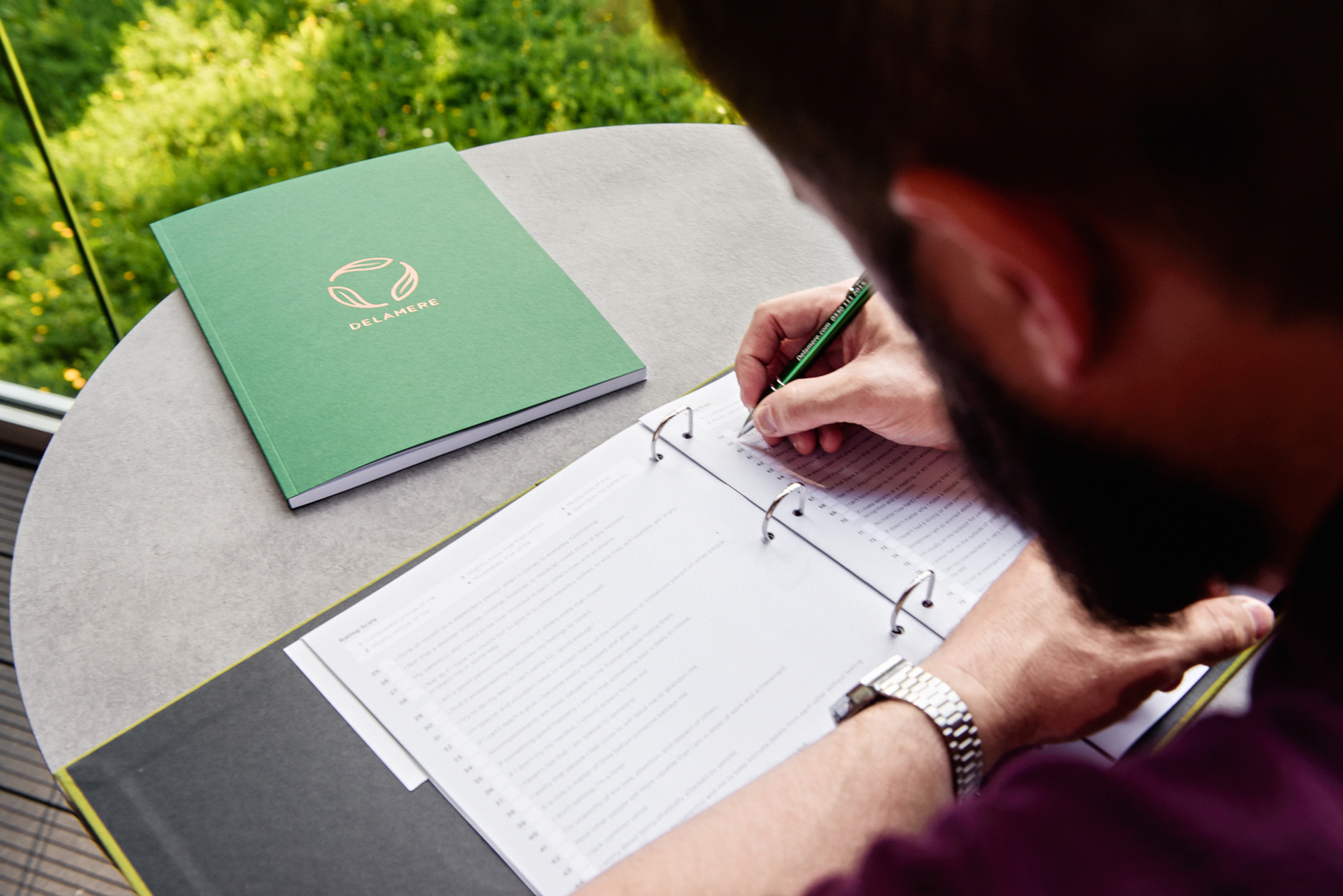-
Call Us: 0330 111 2015


Learn how to overcome unpleasant alcohol withdrawal symptoms with a supervised detox and psychotherapy at Delamere wellness retreat
If you’ve decided it’s time to get sober, you’ll probably be wondering what will happen when you stop drinking. Heavy drinkers and people who are dependent on alcohol will experience a range of symptoms when they reduce or stop their alcohol intake. This is known as Alcohol Withdrawal Syndrome (AWS). Symptoms from alcohol withdrawals vary from mild to severe depending upon the amount and length of time you’ve been drinking.
Anyone suffering with alcohol addiction should seek professional help before attempting to quit alcohol alone.
Alcohol addiction is a brain disease characterised by an uncontrollable, compulsive desire to drink regardless of the negative impact on work, friends and family life. Delamere takes a holistic approach to treatment for substance abuse which not only tackles the short-term symptoms of alcohol withdrawal but also the long-term physical and psychological effects. Here, we share what alcohol withdrawals are like, how long you can expect to experience symptoms and what treatment options are available.
If you’re worried about alcohol withdrawals, contact our team today and learn more about the different programmes we offer here at Delamere.
Whether you’ve chosen to give up drinking or have been forced to quit for medical reasons, stopping suddenly can have serious consequences. This is because alcohol addiction causes physical and mental changes in your body. It interferes with your central nervous system, forcing it to adapt and work differently to accommodate the effects of alcohol. When drinking is removed from the equation, the body is thrown out of balance, and this marks the onset of alcohol withdrawal symptoms.
Day one
During the first 24 hours of alcohol withdrawals you will start to experience symptoms such as anxiety, restlessness, sweating, headache and nausea. Drinking lots of water and eating a healthy diet is crucial at this point because you’ll be dehydrated and feeling weak.
One to two days
After the initial shock to your system, more intense alcohol withdrawal symptoms will start to surface. This could include fever and chills, irregular breathing and heart rate, irritability and mood swings. The most serious symptom from alcohol withdrawals is severe shaking, convulsions and hallucinations, known as delirium tremens (DTs). These can cause seizures and even death in the worst cases.
Up to 72 hours
By now, some bodily functions, such as blood pressure, will have started to return to normal. Many of the most common symptoms of alcohol withdrawal will have subsided by now but you may still be left with intense cravings which can be particularly difficult to manage without the right support. If alcohol is readily available, you may be in danger of relapsing.
Week 1
Things are starting to improve. You should now have more energy and generally look and feel healthier. One week in, you’ll be over the worst of your alcohol withdrawal symptoms and will feel more able to cope. Unfortunately, tackling the physical symptoms of alcohol addiction is not enough to achieve a lifetime of sobriety. This is when the real work begins. Talk to a therapist, either one-to-one or in a group setting, about the reasons for your alcohol addiction and they will help you find ways to rebuild your life without alcohol.
While it’s possible to tackle alcohol withdrawal alone, it isn’t recommended. As the body and brain are adjusting to functioning without alcohol there is a very fine line between recovery and relapse. Getting pharmacological and nutritional support can reduce the severity of alcohol withdrawal symptoms by carefully balancing what your body needs and help to prevent any serious complications.
Medications that can ease the alcohol withdrawal process include benzodiazepines and naltrexone which help to slow down the brain’s neurotransmitters to reduce cravings.
Following a medically supervised alcohol detox, dependent drinkers should undergo psychological intervention, such as Cognitive Behavioural Therapy (CBT), to combat the mental effects of alcohol withdrawals. CBT helps people to make sense of their addiction and learn coping mechanisms to prevent unhealthy thought patterns.
Aftercare is one of the key components of successful rehabilitation. Someone who is overcoming alcohol withdrawals needs a good support network and ongoing counselling to avoid setbacks and remain in active recovery. Delamere’s residential rehab programmes for alcohol addiction include 12 months of aftercare.
Delamere is the first purpose-built retreat for addiction treatment in the UK. Set in unique forest surroundings, we provide a quiet, calm environment that helps to make the alcohol withdrawal process safe and comfortable. Every guest has their own ensuite room away from the temptations of alcohol and other triggers, where they can rest and recuperate.
You will have access to a dedicated clinical team, 24/7, who will monitor your alcohol withdrawal symptoms and adjust medication and nutritional support to suit your needs. The initial alcohol detox usually takes around one week to complete. Following this, you will be in the care of our holistic therapists, who will guide you in one-to-one counselling sessions and group therapy work.
We’re firm believers in treating the person rather than the symptoms. We take a holistic approach to your care and will develop a programme that nurtures your physical, psychological and emotional well-being. Guests can choose from a wide range of evidence-based therapies, from somatic healing practices to equine therapy. Whatever it takes to stop the cravings, start the healing process and grow beyond addiction.

Spend time with our therapists to discover what led you to this behaviour in the first place
Delamere treatment model Delamere treatment model
Set healthy boundaries,
exciting new goals and prepare for
life after Delamere

Everything we do here is about outcomes. Focusing on getting you back to yourself again in the short term, but then growing beyond that when you leave Delamere. Helping you create the foundations for long-term recovery and growth.
There’s no one-size-fits-all here. We listen, learn and tailor our programmes to meet your personal needs, whatever they may be. Your journey to recovery is yours, so we design our programmes with you in mind.


Nature and creativity often bring out the best in people, especially after a difficult period in their life. We offer equine and art therapy, fire ceremonies, nature walks and more to help you relax, reflect and see the world in a new way.

Martin Preston, Founder & CEO at Delamere
We can help you to give up alcohol safely and comfortably.
Find a programmeIf yourself, or a friend, family member or work colleague is struggling with alcohol addiction, it’s important they get help.
Our admissions team is on hand 24/7 to help answer any questions about our alcohol detox programmes and make sure your loved one gets the support they need.
Call the team today on 0330 111 2015 to discuss the different options available.
Read our guide to withdrawal & recovery of librium. We discuss the addictive potential & when a Librium detox may be required.
Read More
A guest blog from Robbie Ransom at Barney Recovery introducing the Delamere Alumni app, measuring the outcomes of addiction recovery for our guests.
Read More
We are back with another Alumni story. We chatted with Jerome as he shared his transformation over the last few years at Delamere.
Read More